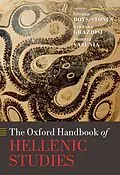The Oxford Handbook of Hellenic Studies is a unique collection of some seventy articles which together explore the ways in which ancient Greece has been, is, and might be studied. It is intended to inform its readers, but also, importantly, to inspire them, and to enable them to pursue their own research by introducing the primary resources and exploring the latest agenda for their study. The emphasis is on the breadth and potential of Hellenic Studies as a flourishing and exciting intellectual arena, and also upon its relevance to the way we think about ourselves today.
Autorentext
George Boys-Stones is Senior Lecturer in Classics, Durham University. Barbara Graziosi is Senior Lecturer in Classics, Durham University. Phiroze Vasunia is Reader in Classics, Reading University.
Zusammenfassung
The Oxford Handbook of Hellenic Studies is a unique collection of some seventy articles which together explore the ways in which ancient Greece has been, is, and might be studied. It is intended to inform its readers, but also, importantly, to inspire them, and to enable them to pursue their own research by introducing the primary resources and exploring the latest agenda for their study. The emphasis is on the breadth and potential of Hellenic Studies as aflourishing and exciting intellectual arena, and also upon its relevance to the way we think about ourselves today.
Inhalt
- I. Hellenes and Hellenisms
- 1: Introduction
- 2: James I. Porter: Hellenism and Modernity
- 3: Yannis Hamilakis: Indigenous Hellenisms / Indigenous Modernities
- 4: Robert Rollinger: Near Eastern Perspectives on the Greeks
- 5: Franco De Angelis: Colonies and Colonization
- 6: Polly Low: The Athenian Empire
- 7: Pierre Briant: Alexander the Great
- 8: Susan Stephens: Hellenistic Culture
- 9: Alessandro Barchiesi: Roman Perspectives on the Greeks
- 10: Tim Whitmarsh: Greece under Rome
- 11: Erich S. Gruen: Hebraism and Hellenism
- 12: Gotthard Strohmaier: The Greek Heritage in Islam
- 13: Christopher S. Celenza: Hellenism in the Renaissance
- 14: Paul Cartledge: Hellenism in the Enlightenment
- 15: Luciano Canfora: Ideologies of Hellenism
- II. The Polis
- 1: Introduction
- 2: James Redfield: The Polis
- 3: Sara Forsdyke: Civic Institutions
- 4: Sitta von Reden: Economy and Trade
- 5: Peter Hunt: War and Society
- 6: Robin Osborne: Urban Landscape and Architecture
- 7: John Ma: The City as Memory
- 8: Christopher Gill: Ancient Concepts of Personal Identity
- 9: Fiona Hobden: Symposium and the Culture of Consumption
- 10: Claude Calame: Age, Peer Groups, Rites of Passage
- 11: Eva Cantarella: Friendship, Love, and Marriage
- 12: Laura McClure: Sexuality and Gender
- 13: Page duBois: Slavery
- 14: Benjamin Isaac: Ethnic Prejudice and Racism
- 15: Kim Ayodeji: Maritime Identities
- 16: Maria Pretzler: Travel and Travel Writing
- 17: Julia Kindt: Religion
- 18: Jason König: Games and Festivals
- 19: Carol Dougherty: Just Visiting: The Mobile World of Classical Athens
- 20: C. J. Rowe: Political Theory
- III. Performance and Texts
- 1: Introduction
- 2: Gregory Nagy: Performance and Text in Ancient Greece
- 3: Wolfgang Rösler: Literacy and Books
- 4: Johannes Haubold: Epic Poetry
- 5: Andrea Capra: Lyric poetry
- 6: Oliver Taplin: Tragedy
- 7: David Konstan: Comedy
- 8: Caroline Dewald: Historiography
- 9: Lene Rubinstein: Oratory
- 10: William D. Desmond: Low Philosophy
- 11: Dirk Baltzly: High Philosophy
- 12: Derek Collins: Magic
- 13: Brooke Holmes: Medicine
- 14: Eleonora Rocconi: Music
- 15: Reviel Netz: Exact Sciences
- 16: Alexander Sens: Hellenistic Poetry
- 17: Christopher Pelling: Biography
- 18: Stephen A. Nimis: The Novel
- 19: Andrew Ford: Performance
- IV. Methods and Approaches
- 1: Introduction
- 2: G. E. R. Lloyd: Comparative Approaches to the Study of Culture
- 3: Emily Greenwood: Postcolonialism
- 4: Walter Scheidel: Demography and Sociology
- 5: Jan N. Bremmer: Myth, Mythology, and Mythography
- 6: Marilyn Skinner: Gender Studies
- 7: Philomen Probert: Comparative Philology and Linguistics
- 8: P. J. Rhodes: Epigraphy
- 9: James Whitley: Archaeology
- 10: Andrew Meadows: Numismatics
- 11: Natalie Tchernetska: Manuscript Studies
- 12: David Armstrong: Papyrology
- 13: Luigi Battezzato: Textual Criticism
- 14: Barbara Graziosi: Commentaries
- 15: Rachel Bowlby: Psychoanalysis
- 16: Alexandra Lianeri: Translation Studies
- 17: Pantelis Michelakis: Film Studies
- 18: Miriam Leonard: Reception
